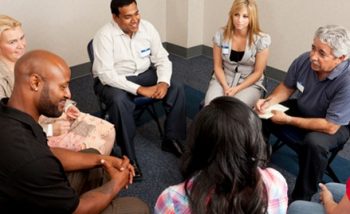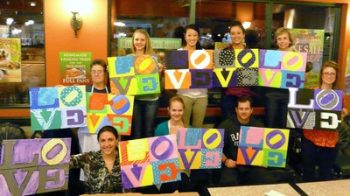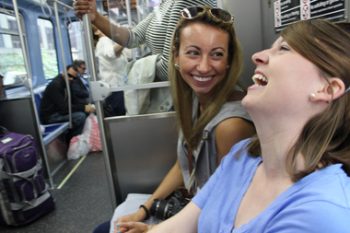Our neighborhood is going crazy. Now in the days of the internet and social media, it is  much easier to criticize others. In the old days, people actually talked to each other and therefore chose their words more carefully. Being insulting and critical is simple to do via electronic communication and hard to do via old fashioned, ‘real’ communication. Some in our neighborhood are taking advantage of this electronic simplicity and criticizing the innocent and kicking others when they are down. There have been extreme cases of this sort of cyber-bullying in the news that have even led the victims to suicide.
much easier to criticize others. In the old days, people actually talked to each other and therefore chose their words more carefully. Being insulting and critical is simple to do via electronic communication and hard to do via old fashioned, ‘real’ communication. Some in our neighborhood are taking advantage of this electronic simplicity and criticizing the innocent and kicking others when they are down. There have been extreme cases of this sort of cyber-bullying in the news that have even led the victims to suicide.
This is the antithesis of social support. It is hurtful and destructive not only for the target of the attacks, but also for those who are delivering the blows (be they right or wrong). It sucks out energy, and only creates more animosity. It’s not healthy living.
Real social support is very beneficial. In prior blogs we discussed benefits of family relationships. To some degree, having good family relationships is like winning the lottery…. you just get lucky with who your parents are. But what about those of us who were not so blessed? Let us turn to the advantages of other social relationships.
 Consider this:
Consider this:
* In breast cancer survivors, social support decreases anxiety, stress, depression, pain and fatigue.1
* In breast cancer survivors, social support increases mood, self-image, ability to cope, sexual function, and feelings of control.1
* In patients with coronary artery disease, those with social ties were 2.4 times more likely to survive than those who were socially isolated.2
* A study in 1997 tested putting the cold virus in the nose of 276 healthy volunteers. Those with many social contacts were 4 times less likely to catch a cold.3 (note: to my knowledge, they didn’t test the sanity of those who volunteered to have the cold virus put up their nose.)
* Social isolation leads to higher rates of morbidity, mortality, infection, depression, and cognitive decline.4
The good news is that social contacts can be created and built upon. Certainly the above health aspects are useful reasons to develop relationships, but probably the most valuable reason is personal happiness. Socializing can provide entertainment, and humor in addition to warding off boredom and loneliness. These relationships can be built in a variety of ways including:
* Go to church. Talk to people there. Join a Bible study or small group. Ask the pastor for  contact suggestions.
contact suggestions.
* Take a class and make it a fun one where you actually communicate with other students (like arts, physical education, photography, music or foreign language)
* Join a book club or crafts group
* Get off of your….couch (this is a G-rated blog so the wording is chosen carefully), and join an exercise group such as jazzercise, yoga, or Tai Chi
* Get involved in a volunteer group
* Go to a support group. There are lots of them out there which cover a broad range of diseases. This could be either for a problem of your own, or for that of a family member or friend. If you are troubled by depression, anxiety, or grief then check in with a counsellor and try a join a support group for it.
Bottom line: Social support can be created and developed. A strong support system will benefit your health and happiness.
 There was a study done of commuters using either trains or buses. They were divided into 3 groups: one group was told to talk to strangers, one group was told to sit in solitude, and one group was told to do their normal commute. Going into it, the ones told to talk to strangers thought it would be a negative experience but they actually reported the most positive experience and an improved sense of well-being.5
There was a study done of commuters using either trains or buses. They were divided into 3 groups: one group was told to talk to strangers, one group was told to sit in solitude, and one group was told to do their normal commute. Going into it, the ones told to talk to strangers thought it would be a negative experience but they actually reported the most positive experience and an improved sense of well-being.5
Talking to strangers may be hard for many of us to do, especially since we were taught to not talk to strangers when we were kids. Just keep in mind:
* Everyone you know was a stranger to you once. That means that in the strictest sense even self-talk would be eliminated (at least until you got to ‘know yourself’ – think about that).
* We were also told we had to eat all the food off our plates because of all the starving kids around the world. Now all of those ‘once starving’ kids are poking fun at overweight Americans.
* If you are old enough to read this blog, then you probably can push away from the table and go make a friend. Have at it.
Next Time-A Mother’s Day blog
1. Benefits of Social Support, Susan G. Komen, www.komen.org.
2. Brummett, Beverly H. et al, Characteristics of Socially Isolated Patients with Coronary Artery Disease Who Are at Elevated Risk for Mortality. Psychosomatic Medicine. 2001; 63:267–72. [PubMed]
3. Cohen, Stephen A. et al, Social Ties and Susceptibility to the Common Cold, JAMA 1997, Jun 25; 277 (24) 1940-4.
4. Cornwell, Erin York and Waite, Linda J., ‘Social Disconnectedness, Perceived Isolation, and Health among Older Adults’, J Health Social Behavior, 2009 Mar; 50(1): 31-48.
5. Epley, Nicholas and Schroeder, Juliana, ‘Mistakenly Seeking Solitude’, Journal of Experimental Psychology, July 14, 2014.